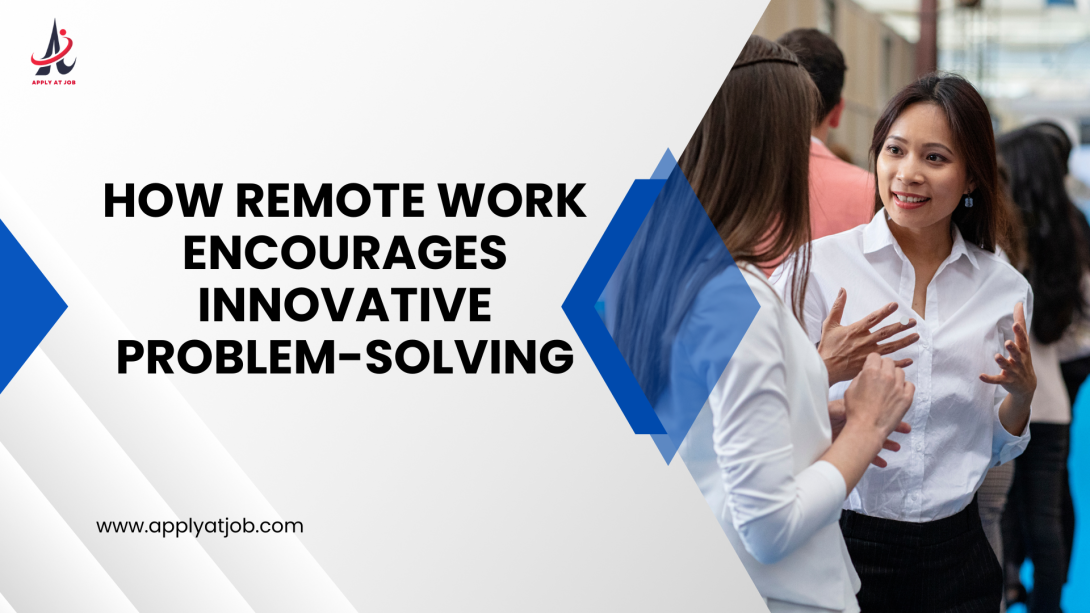
How Innovative Problem-Solving Is Encouraged by Remote Work
For millions of professionals worldwide, working remotely has become the new standard in today's quickly changing workplace. One important but sometimes disregarded advantage of working remotely is its influence on encouraging creative problem-solving, even if others may highlight its ease, flexibility, or work-life balance. When teams are dispersed across time zones and geographical regions, remote work inherently fosters an atmosphere that promotes innovation, teamwork, and original problem-solving. Let's examine in more detail how creative problem-solving is fostered by remote employment.
2. Increases Flexibility Originality
Employees who work remotely can frequently arrange their days however they see fit. Early in the morning is when some people are most creative, while late at night is when others are most productive. When it comes to problem-solving, this freedom enables employees to reach their most creative and productive states.
Remote workers might benefit from their natural cycles, unlike those in the usual 9–5 office setting where creativity could be constrained by set time constraints. Employees may approach problem-solving with greater vigor, clarity, and focus when they are allowed to work during their most creative periods, which results in creative solutions.
3. Cooperation Using Tools and Technology
Digital technologies are essential for collaboration, project management, and communication in remote work. In addition to being effective, these tools can inspire original approaches to problem-solving. Real-time brainstorming, criticism, and idea sharing are all made possible by platforms like as Zoom, Microsoft Teams, and Slack. Teams may use tools like Trello or Miro to graphically plan out ideas and challenges, which encourages innovative thinking.
Additionally, asynchronous communication allows team members to consider ideas before participating, which frequently results in more well-considered and developed solutions. Working remotely promotes the use of a range of technological tools that streamline and improve teamwork, spurring innovation in many fields.
4. The Capacity to Operate in Various Settings
Employees who work remotely are allowed to select their workspace, whether it be a coworking space, coffee shop, or home office. Shifting surroundings can stimulate original thought and provide new insights. Stepping away from their typical office, whether it be to go for a stroll, work outside, or set up in a different place, helps many individuals gain perspective and approach challenges in fresh ways.
The conventional workplace setting, on the other hand, may frequently feel repetitive and inhibit innovation. Remote employment helps individuals to think creatively and find novel solutions to problems they encounter by enabling them to switch up their surroundings as necessary.
5. Autonomy Encourages Innovation and Ownership
Employees who work remotely usually feel more independent. Remote workers are more in control of how they handle tasks and obstacles since they are not subject to continual supervision or micromanagement. Employees are empowered to try new things, take calculated chances, and come up with innovative solutions without worrying about being judged right away because to this autonomy, which also promotes a sense of ownership.
Employees are more inclined to think critically and innovate rather than follow traditional procedures when they feel trusted and accountable for their job. Innovative ideas that would not surface in a more regulated office setting can result from the flexibility to experiment and explore in a remote location.
6. Work Done Asynchronously Encourages Self-Sufficiency in Solving Problems
Employees frequently operate asynchronously in distant work environments, particularly in multinational teams dispersed across time zones. Because work is asynchronous, people must solve problems on their own without instant access to coworkers. Employees get greater independence and resourcefulness as a result, learning how to troubleshoot, investigate, and test solutions independently.
The absence of prompt feedback might encourage employees to think more deeply and come up with original solutions to problems before asking for help from colleagues. The capacity to tackle issues on one's own fosters an innovative and proactive culture, even if teamwork is still essential.
7. Dismantling Barriers in Hierarchy
Traditional office hierarchies are frequently flattened by remote work, which promotes candid communication and teamwork at all organizational levels. Remote teams could feel more at ease exchanging ideas and participating in problem-solving procedures without the actual presence of managers or office politics.
A culture where all ideas are treated equally, regardless of the contributor's position within the organization, is fostered by the dismantling of hierarchical barriers. Organizations may access a greater variety of creative ideas when staff members are encouraged to openly express their views.
8. Promotion of Long-Term Planning
There could be a stronger emphasis on immediate successes and solutions to issues in an office setting. On the other hand, working remotely promotes a longer-term, more strategic approach to problem-solving. This change happens because remote teams are frequently free from outside distractions and have more time to consider the underlying causes of issues rather than only treating their outward manifestations.
With the freedom to explore intricate challenges without the need for a quick fix, remote workers can create more creative and long-lasting solutions that not only address the current issue but also avert future occurrences of the same kind.
Conclusion:
Working remotely is more than simply working from a different place; it's a radical change in how individuals approach their jobs and solve problems. Innovative solutions to problems are naturally encouraged in remote work environments because they promote variety, autonomy, flexibility, and creativity. The advantages of remote work in terms of creativity, productivity, and employee happiness will only increase as more businesses adopt this approach. Businesses that take advantage of these possibilities to solve problems will be better positioned to prosper in a cutthroat and dynamic economy as remote work continues to develop.
You can visit our site: Applyatjob.com
https://applyatjob.com/hiring-employee
https://applyatjob.com/jobs




